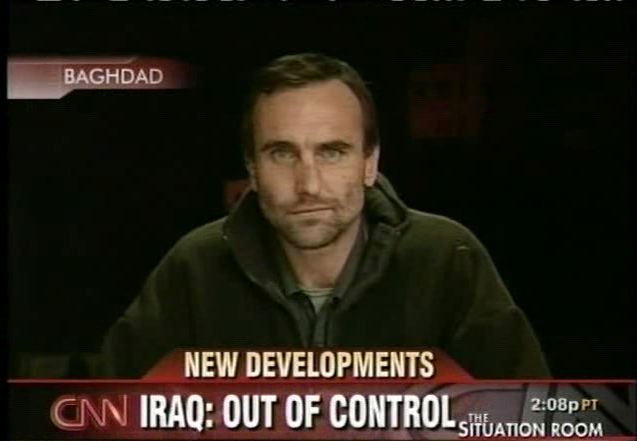TSR: "...just another day in Baghdad."

Click photo to play
Length: 4:25
JOHN KING: And to our viewers, you're in THE SITUATION ROOM, where new pictures and information are arriving all the time. Standing by, CNN reporters across the United States and around the world. Happening now...
KING: And, while President Bush prepares for this summit, his summit partner is struggling just to hold on to power. Does a Shiite leader now hold the real power in Iraq?
Correspondent Michael Ware joins us now from Baghdad.
Michael, Muqtada al-Sadr has played his card, essentially warning Prime Minister Maliki, "go meet with Mr. Bush, and we will take down your government." Mr. Maliki doesn't have any good choices here, does he?
MICHAEL WARE, CNN CORRESPONDENT: Absolutely not.
I mean, if ever there was a political leader between a rock and a hard place, it's Prime Minister Nouri al-Maliki. Now, remember, this is a politician who, on his own, has no popular base, no constituency. And, unlike everyone else involved in this government, he lacks the true currency of political power in this country, and that is an armed militia. So, what's propping him up? He's relying principally on American support to keep him where he is, and try to develop a popular base for him.
In the meantime, in the realpolitik of the Iraqi dynamic, he had to turn to the powerful political faction and the even mightier militia faction loyal to anti-American rebel cleric Muqtada al-Sadr.
At the end of the day, it was Muqtada's support that saw him land in the prime minister's chair. Now we're seeing these two opposing interests that he draws upon -- in fact, vehement enemies -- coming to a head. I mean, he's due to meet with President George W. Bush next week, yet, we're hearing one of Muqtada's leading politicians warn that if the Shia population does not see immediate improvement, then if he meets with what they call the criminal Bush, they will suspend involvement in this parliament.
He's a man left with very few choices -- John.
KING: And, Michael, what's the end goal of al-Sadr's power play? Is there a scenario in Iraq that shows Mr. al-Sadr perhaps wanting to be the next leader?
WARE: For Muqtada to be able to maneuver into a position like that means that a lot of carnage would have had to have taken place to remove other obstacles in his path, primarily, the SCIRI political organization, and its very well-equipped, very well-trained, very experienced and disciplined Badr militia.
So, there's still a lot of obstacles in his way, before we see any kind of development like that. And a lot of blood would have to flow before we come to that -- John.
KING: Michael, you have been there for some time. You have seen the worst. Put the past 24 hours into context for us.
WARE: Well, John, in one sense, this is just another day in Baghdad. As spectacular as it was, the litany of death and attack and agony in this country is a daily occurrence. I mean, this was a stunning and atrocious slaughter.
I mean, this was a Thanksgiving Day massacre. But it was just one moment of punctuation in a long, evolving chapter of what is essentially a civil war. We have seen mass strikes like this before. This is the largest. It is not on its own. It's not in isolation. And, I dare say, there are others to follow.
In the meantime, we see the institutionalization of Shia death squads striking back at the Sunni community, men showing up in legitimate government uniforms, driven by legitimate government vehicles at Sunni homes at night, hauling men off, never to be seen again.
So, this is just separate faces of a long, ugly continuum of civil war.
KING: Michael Ware for us in Baghdad -- Michael, thank you very much.
WARE: Thank you, John.
